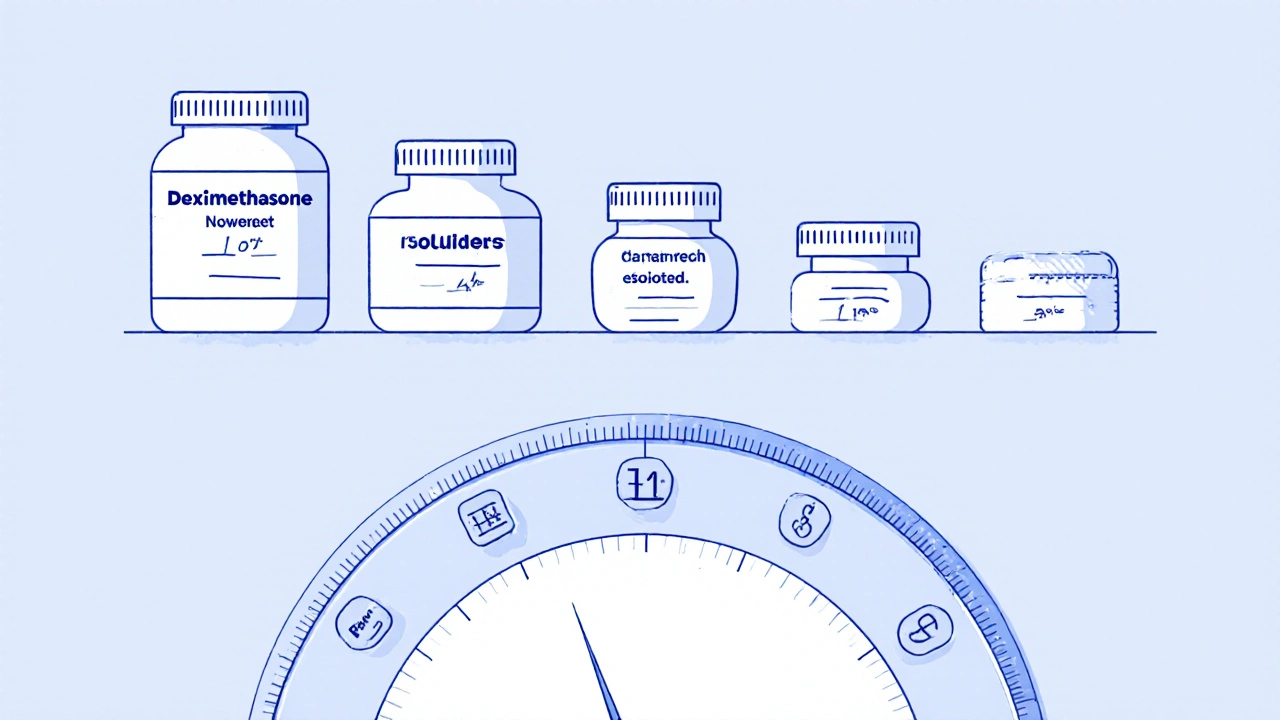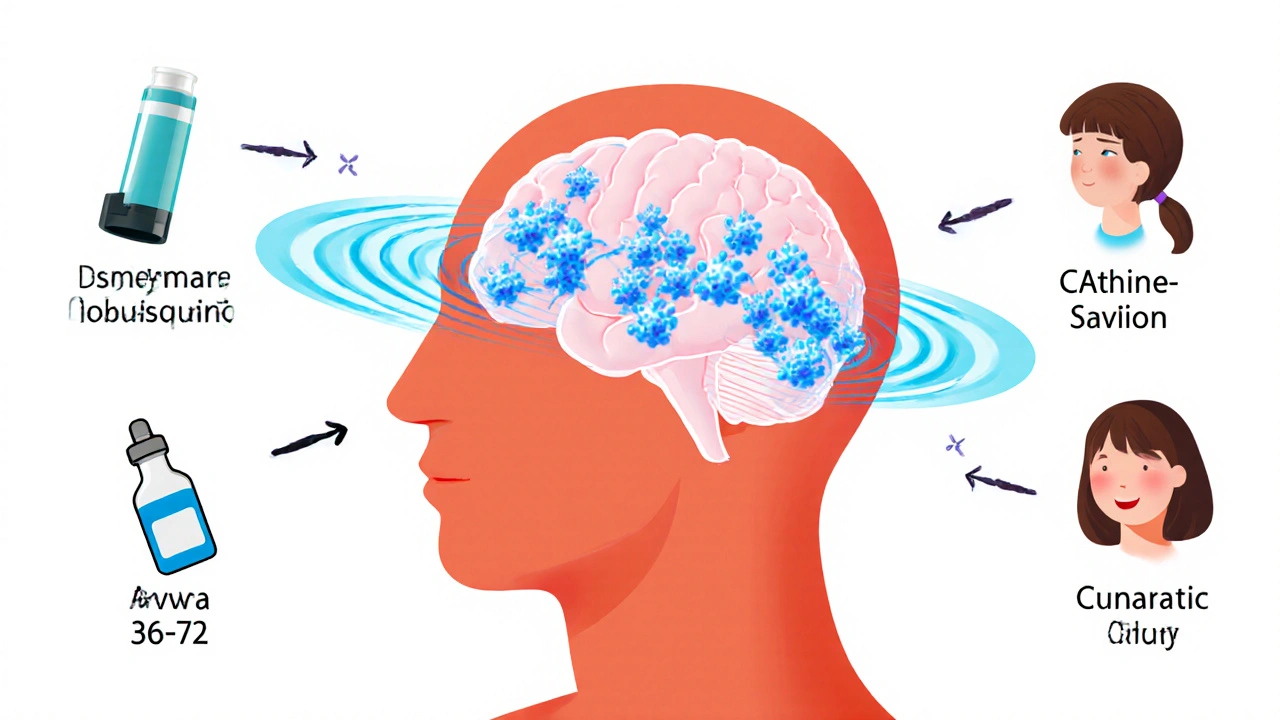Corticosteroid Potency Converter
Convert doses between common corticosteroids based on relative potency. Note: Clinical decisions should always be made with a healthcare provider.
Important: Conversion between corticosteroids is based on relative potency. However, individual patient factors, half-life differences, and clinical context significantly impact treatment decisions. Always consult a healthcare provider for medical advice.
When your body is fighting severe inflammation, allergies, or autoimmune flare-ups, doctors often turn to dexamethasone-the active ingredient in Decadron. It’s powerful, fast-acting, and used in everything from asthma attacks to brain swelling after injury. But it’s not the only option. Many people wonder: is there something safer, cheaper, or just as effective? Let’s break down how Decadron stacks up against other common corticosteroids and what really matters when choosing one.
What Is Decadron (Dexamethasone)?
Dexamethasone is a synthetic glucocorticoid, a type of steroid that mimics cortisol, your body’s natural stress hormone. It’s about 25 times more potent than hydrocortisone and has a long half-life-meaning one dose can last 36 to 72 hours. That’s why it’s often used in single-dose treatments, like for croup in kids or to prevent nausea during chemotherapy.
It works by suppressing the immune system’s overreaction. That’s great for reducing swelling, redness, and itching. But it also means side effects can pile up if you use it too long: weight gain, high blood sugar, mood swings, bone thinning, and increased infection risk. Most people tolerate short-term use well, but long-term use needs careful monitoring.
Common Alternatives to Decadron
Doctors don’t always reach for Decadron first. Depending on the condition, they might pick another steroid-or even skip steroids entirely. Here are the most common alternatives and how they compare.
Prednisone
Prednisone is probably the most familiar steroid after dexamethasone. It’s often prescribed for arthritis, allergic reactions, and skin conditions. Unlike Decadron, prednisone needs to be converted by the liver into its active form, prednisolone. That makes it less predictable in people with liver problems.
It’s also shorter-acting. You usually take it multiple times a day for a few days or weeks. That means more chances for side effects to creep in. But prednisone is cheaper and comes in liquid form, which helps for kids or people who can’t swallow pills.
Hydrocortisone
Hydrocortisone is the weakest of the bunch. It’s what you find in over-the-counter creams for eczema or insect bites. Oral hydrocortisone is used for adrenal insufficiency, not inflammation. It’s rarely used as a replacement for Decadron in serious cases because you’d need to take a lot of pills to match its strength.
For example, 0.75 mg of dexamethasone equals about 20 mg of hydrocortisone. That’s why hydrocortisone isn’t practical for acute conditions like spinal cord compression or severe allergic reactions.
Methylprednisolone
Methylprednisolone (sold as Medrol) sits between prednisone and dexamethasone in strength and duration. It’s about 5 times stronger than hydrocortisone and lasts about 18-36 hours. It’s commonly used in IV form for sudden flare-ups-like in multiple sclerosis or severe asthma.
Compared to Decadron, methylprednisolone requires more frequent dosing. But it’s often preferred in hospital settings because it’s available as an injection and has a slightly better safety profile for short bursts. Some studies show it causes less blood sugar spikes than dexamethasone in ICU patients.
Triamcinolone
Triamcinolone is often used for joint injections or skin conditions. It’s not typically given orally as a replacement for Decadron. But in some cases, like chronic inflammatory bowel disease, it might be used for its local effect with less systemic impact.
Its downside? It can linger in the body longer than expected, increasing the risk of adrenal suppression if used repeatedly. It’s also not ideal for patients with diabetes because it raises blood sugar more than dexamethasone in some cases.
Comparison Table: Dexamethasone vs Alternatives
| Medication | Relative Potency | Half-Life | Typical Use | Key Advantage | Key Limitation |
|---|---|---|---|---|---|
| Dexamethasone (Decadron) | 25x hydrocortisone | 36-72 hours | Brain swelling, severe allergies, chemotherapy nausea | Long-lasting; single-dose often enough | Higher risk of blood sugar spikes |
| Prednisone | 4x hydrocortisone | 18-36 hours | Asthma, rheumatoid arthritis, skin rashes | Oral liquid form; cheaper | Requires liver conversion; multiple daily doses |
| Methylprednisolone | 5x hydrocortisone | 18-36 hours | IV for acute flares, MS relapses | Good for hospital use; less glucose impact | Still causes insomnia and mood changes |
| Hydrocortisone | 1x (baseline) | 8-12 hours | Adrenal insufficiency, topical use | Safest for long-term replacement | Too weak for acute inflammation |
| Triamcinolone | 5x hydrocortisone | 18-36 hours | Joint injections, eczema | Good for localized treatment | Prolonged adrenal suppression risk |

When Do Doctors Choose Dexamethasone Over Others?
Dexamethasone isn’t the first choice for every condition. But it shines in specific situations:
- Brain swelling from tumors or trauma: Decadron crosses the blood-brain barrier better than most steroids.
- Severe allergic reactions: A single 6-10 mg dose can stop anaphylaxis in its tracks.
- Preventing chemotherapy nausea: It’s part of the standard combo with anti-nausea drugs.
- Croup in children: A single oral dose reduces hospital stays by half.
- COVID-19 pneumonia: In 2020, the RECOVERY trial showed dexamethasone reduced death rates in ventilated patients by one-third.
These aren’t minor uses. They’re life-saving. That’s why dexamethasone became a household name during the pandemic. It’s not always the best-it’s the right tool for the job.
When Should You Avoid Dexamethasone?
Decadron isn’t safe for everyone. Avoid it if you have:
- Active fungal infections (steroids can make them spread)
- Peptic ulcers or gastrointestinal bleeding
- Uncontrolled diabetes
- Recent live vaccines (steroids weaken immune response)
- Severe mental health conditions like psychosis
Also, never stop dexamethasone suddenly if you’ve taken it for more than a week. Your body can stop making its own cortisol. Tapering is essential. Many people don’t know this-until they feel dizzy, nauseous, or collapse.

Non-Steroid Alternatives
Not everyone needs steroids. For mild allergies, antihistamines like cetirizine or loratadine work well. For arthritis, NSAIDs like ibuprofen or naproxen are first-line. For autoimmune diseases, newer biologics like adalimumab or rituximab target specific immune cells without suppressing the whole system.
These aren’t direct replacements for dexamethasone, but they’re safer for long-term use. If you’re on steroids for months, ask your doctor if a biologic or immunosuppressant could replace them. You might avoid weight gain, bone loss, and diabetes risk.
What About Cost and Availability?
Dexamethasone is cheap. In Australia, a 10-tablet pack of 0.5 mg tablets costs under $5 with a prescription. Prednisone is similar. Methylprednisolone is a bit pricier, especially in IV form.
But cost isn’t everything. If you need a single dose for croup, dexamethasone’s long action means fewer trips to the ER. That’s value. If you’re managing chronic inflammation, a daily prednisone might be easier to track than a weekly dexamethasone.
Final Thoughts: No One-Size-Fits-All
There’s no “best” steroid. Dexamethasone is powerful, precise, and life-saving in emergencies. But for everyday inflammation, prednisone or even NSAIDs might be smarter. The right choice depends on:
- How severe your symptoms are
- How long you’ll need treatment
- Your other health conditions
- Whether you can tolerate side effects
If you’re prescribed Decadron, ask: Why this one? Is there a safer option for my situation? Don’t assume stronger means better. Sometimes, less is more.
Is dexamethasone stronger than prednisone?
Yes, dexamethasone is about 6 times more potent than prednisone. A 0.75 mg dose of dexamethasone equals roughly 5 mg of prednisone. That’s why dexamethasone is often used in lower doses and less frequently.
Can I switch from dexamethasone to prednisone?
Yes, but only under medical supervision. Switching requires adjusting the dose based on potency. For example, 6 mg of dexamethasone daily equals about 30-40 mg of prednisone. Stopping or switching abruptly can cause adrenal crisis.
Does dexamethasone cause weight gain like other steroids?
Yes, but it depends on duration. Short-term use (a few days) rarely causes noticeable weight gain. Long-term use-even at low doses-can lead to fluid retention and increased appetite. Dexamethasone’s long half-life means it stays in your system longer, potentially increasing this effect compared to shorter-acting steroids.
Is dexamethasone safe for children?
Yes, when used appropriately. It’s commonly given as a single oral dose for croup and has a strong safety record in kids. Dosing is based on weight, and side effects are rare with short-term use. Never give it to a child without a doctor’s direction.
Are there natural alternatives to dexamethasone?
No natural remedy matches dexamethasone’s potency for acute inflammation. Turmeric, ginger, and omega-3s have mild anti-inflammatory effects but can’t replace steroids in serious conditions like anaphylaxis, brain swelling, or severe asthma. They may help as supports, not substitutes.


California Daughter
October 31, 2025 AT 22:55Vishwajeet Gade
November 2, 2025 AT 09:24Casey Crowell
November 3, 2025 AT 13:55Shanna Talley
November 4, 2025 AT 15:18Samuel Wood
November 5, 2025 AT 03:03ridar aeen
November 5, 2025 AT 21:59Lorne Wellington
November 7, 2025 AT 08:19Will RD
November 8, 2025 AT 06:49Jenni Waugh
November 8, 2025 AT 16:56Norman Rexford
November 9, 2025 AT 07:37Wayne Keller
November 9, 2025 AT 23:56Shana Labed
November 10, 2025 AT 21:13chantall meyer
November 12, 2025 AT 12:11